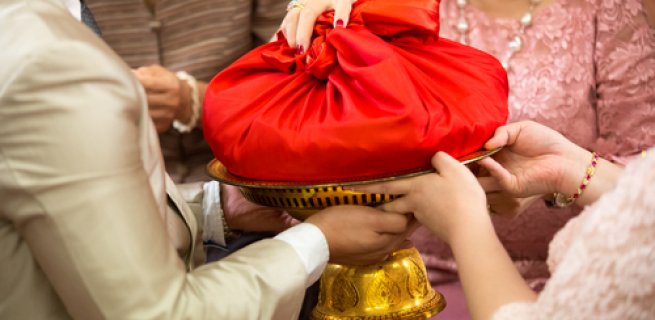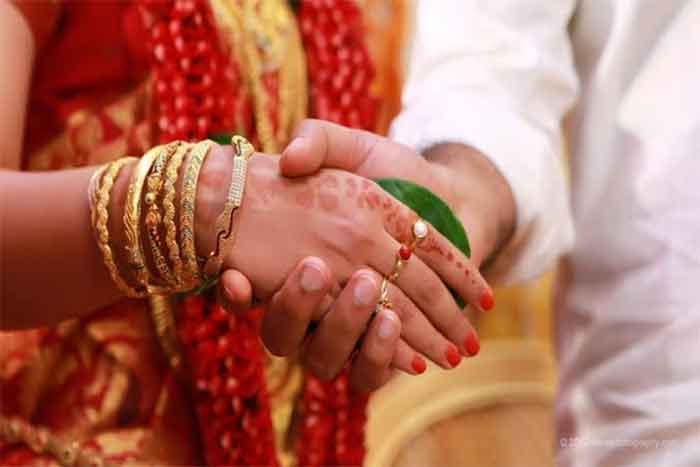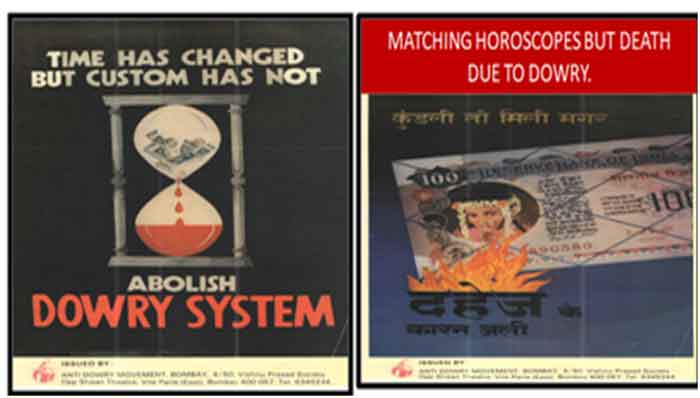
Sixty years ago, in order to eradicate Evil Custom of DOWRY from the society, to eliminate violence against married women for want of Dowry and Dowry Deaths “ Dowry Prohibition Act “ was passed. This Act received the assent of the President of India on 20th May 1961 and the Act came into force on1st July 1961. This date is important because giving or accepting of Dowry is prohibited after the commencement of this Act. The Act would be inapplicable if the Dowry has been given or accepted prior to 1st July 1961, even though the marriage takes place after 1st July 1961. In view of the above fact on 1st July 2021 this Act completes 60 years. However if we go back to history, about 250 years ago Punyashlok Ahilyaabai Holkar the ruler of Malvaa Prant passed Anti Dowry Act. Giving or receiving Dowry was prohibited in the state under her jurisdiction. In some cases she has given harsh punishment to the culprits related to Dowry offences. It proves that this evil custom of Dowry is centuries old. However today even in 21st century we are not successful in eradicating this evil. Many families are destroyed and parents of marriageable girls drowned in debts. One of the causes of Social Instability is Dowry Custom prevalent in our society. Due to natural selfishness of educated and slavish adherence to age old customs & traditions of the uneducated, the sensitivity of the people has become so blunt that Dowry Custom persists unchecked in our society. In Maharashtra State more than 200 Dowry Deaths are recorded every year. According to the authentic figures obtained through RTI Act 2005, during 2016-17, 2017-18, & 2018-19 there were 248, 234 & 214 Dowry Deaths were registered respectively
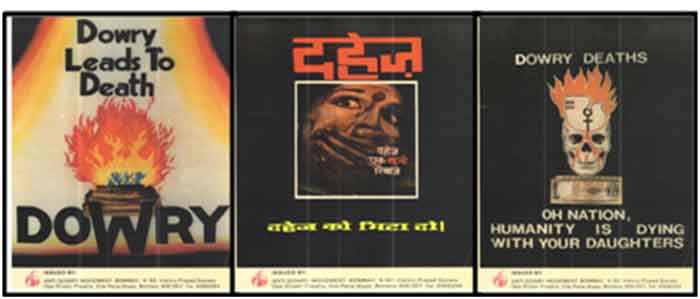
It is a general presumption that educated working women in big cities like Mumbai who are economically independent do not face violence and atrocities due to Dowry Custom. But figures of Dowry Cases prove that it is a false notion. In Mumbai city 26 Dowry Deaths are recorded in first 10 months of year 2018, in which 2 homicides, 16 suicides, and 8 unnatural suspicious deaths are recorded. During the same period 421 complaints are registered about harassment for Dowry demand. H. E. Governor of Maharashtra has mentioned in his message addressed to Anti Dowry Movement that “ It is a matter of great concern that the evil custom of dowry is prevailing in our society even in the 21st Century. There were 24771 cases of dowry deaths in India during 2012-14.” This means 34 dowry deaths per day. This report is very alarming.
“ Dowry “ has been defined in this Law as “ Any property or valuable security given or agreed to be given in connection with the marriage by one party to the other party before or any time after the marriage “
The principle in Indian Constitution of Equality is completely defeated when the custom of dowry is practiced. Though marriage is a need for both bride and groom, however only the bride is considered needy. Groom’s side enjoys superior status in the marriage function, where as Bride’s side is looked upon as low and inferior. It is customary that Bride’s parents should shower the Groom and his family members with rich and costly gifts. This Act has a provision of specific punishment for five years imprisonment and Rs.15,000/- fine to the offender who accepts dowry. If the amount of Dowry is more than Rs.15,000/- fine will be increased accordingly.
Moreover, it is prohibited by this law to demand share in the property and partnership in the business as a condition in the marriage. In case this rule is violated punishment of minimum six months is provided.
According to Section 4 of this Act only making oral demand of dowry is crime and if proved in the court of law, punishment of six months to two years of imprisonment with fine of Rs.10,000/- is provided. Section 4(a) says, giving advertisement for marriage in matrimonial column of news paper with such condition is crime and liable for punishment of six months to 5 years imprisonment with fine of Rs.15,000/- will be given to the offender.
According to one important provision in this Act if anybody other than the bride has accepted any dowry before, after or during her marriage the same should be given to her immediately or within three months from its acceptance, or else the person responsible will be liable for punishment of six months to two years of imprisonment & fine of Rs.10,000/- The court can give orders to the offender to transfer the dowry in the name of the bride. This provision explains the concept of “ Stree-Dhan “ Further the law says, if bride dies before getting back the dowry from the offender the same will be given or transferred to her legal heirs.
Dowry Prohibition Act 1961 is a criminal law. According to the section 7 offering and accepting dowry is a Cognizable Offence. Cases can be filed on the basis of self information by the victim OR Police Report OR information from parents / relations OR complaint registered by any NGO.
The offence under this Act is Non-bailable ( bail can not be sanctioned to the offender) and offence is Non-compoundable also. (The case once filed cannot be settled out of court.)
According to Section 8(a) the offender has to prove that he is not guilty and that he has not accepted any Dowry and has not committed any offence under this Act. This rule is called “Strict Liability.“ According to the principle of Criminal Jurisprudence an accused is presumed to be innocent until his guilt is proved, and it is for the prosecution to prove beyond reasonable doubt that the accused has committed the offence. This section makes an exception to this general rule and shifts the burden on the accused to prove his innocence.
Amendment of Indian Penal Code and Indian Evidence Act are the special features of this Act, which makes the law more stringent. In Indian Penal Code Section 204(b) was included which provides definition of “ Dowry Death “ In case a woman dies an unnatural death within seven years of her marriage and it is proved that before her death she was subjected to cruelty by her husband or in-laws it will be presumed by the court that the death is “Dowry Death”. In terms of Indian Evidence Act Section 114 provides minimum punishment of seven years of imprisonment and maximum of life imprisonment to the offender.
Secondly Indian Penal Code section 498(a) defines Cruelty. This section has been amended to make cruelty to a woman by her husband or in-laws and forcing her to meet their unlawful demands of Dowry will attract punishment with imprisonment up to three years with fine.
Thirdly according to Indian Evidence Act Section 113(a) & 114(b) if atrocities and harassment is proved and the victim dies an unnatural death within seven years of her marriage, the Court will presume that she has been driven towards suicide by her husband and his relatives. In this situation under IPC section 306 provision of 10 years imprisonment & fine is made.
After 1961 twice the Dowry Prohibition Act was amended. First amendment of 1984 came into force on 2nd October 1985. In the definition of Dowry the words “ in consideration for the marriage of the said parties ” have been substituted by the words “in connection with the marriage of the said parties” This change makes the definition of dowry more specific. Second amendment of 1985 came into force on 19th November 1986. This was made by substituting the words “dowry given or agreed to be given at or before or any time after the marriage” for the words “or after the marriage” Both the amendments have made the definition of Dowry very vide and drastic.
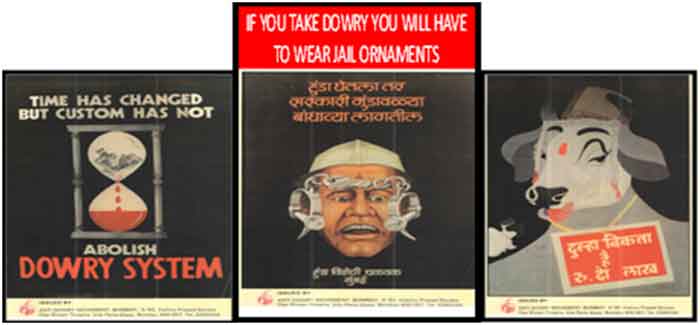
However as per the Recommendation Committee’s opinion, it is highly impossible to prove the transaction of Dowry. It is obvious and for the simple reason that the parents, who are usually the victims, in the interest of the daughter would not say so, and would be reluctant and unwilling to set the law in motion, due to the fear that their daughter could be victimized.
Though the Dowry Prohibition Act 1961 is very stringent, it has been proved to be ineffective, due to overall negligence in it’s implementation and lack of awareness. But the reasons also cannot be ignored.
(1) According to the Section 8(b) of this Act State Govt. has to appoint Dowry Prohibition Officer, who has to strictly implement all the provisions under this Act in the area under his jurisdiction, Stop Dowry Transactions, and collect enough evidence to make the case strong, necessary for the prosecution. However the fact is that appointments of such officers are only on the paper, and those who are appointed are either not aware of their duties or are so over worked that they don’t find time to perform their duties and are not serious about this issue.
(2) Investigating officers are not sensitive enough to understand the seriousness of the situation. There are provisions to take action against the officers and staff who purposefully or intentionally cause delay in investigation of Dowry cases. However the fact is that, no information could be obtained in this regard under Right to Information Act.
(3) Though the Act is stringent, the fact is that nearly 86% of criminals are set free for want of evidence. Crime against the accused cannot be proved due to lack of evidence. This percentage proves that evidence is tampered and not protected properly which is necessary for the prosecution.
(4) On various occasions, time and again Supreme Court has issued directives to the Central and State governments but no action has been taken by the administration. Hence we don’t get expected results, and the act appears to be ineffective.
(5) After a long follow up of many years, Government of Maharashtra has responded to our request to observe 26th November as ANTI DOWRY DAY followed by a week, and has issued circular on 28th July 2006 to that effect. This was done to achieve effective implementation of this Act in the state as per Supreme Court directives. It was expected that various awareness campaigns are organized on all levels, in Govt. Departments. However the fact is that, unfortunately the circular was just filed in the folders and no action taken till date.
(6) The Department of Higher & Technical Education has issued circular to all Universities as well as National Service Scheme Officials and directed them to organize awareness campaigns during the Anti Dowry Week. Further it was expected to submit the report to the Govt. dept. accordingly every year. However the fact is that no report is submitted till date since 2006. Stalwarts from education field are so insensitive that they are just not bothered about the seriousness of the situation.
(7) Our experience is that many police officers and top officials in education and other important fields are not aware about the directives issued by the Supreme Court and the Government.
(8) Sensitivity of the Media has become so blunt that they are just interested in giving coverage to the figures and sensational news about Dowry harassment and Deaths. They have nothing to do with the pangs and sufferings of the victims.
(9) An overworked or overloaded criminal justice system cannot deal with crimes expeditiously. The punishment imposed after undue delay loses its deterrent effect. An effective Police Force and efficient Criminal Justice System have to be in place for effective implementation of this Act.
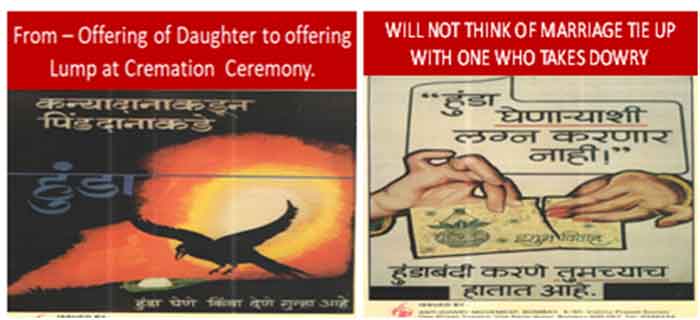
In view of the above facts even after 60 years we are not able to eliminate this Evil Custom of Dowry which is eating up vitals of our society. Suicides of parents who cannot afford to pay Dowry and also of the girls who remain unmarried on this count are on the increase. Yet greed for money seems to have overpowered all constitutional values for which we fought our freedom struggle. Our beloved first Prime Minister Pandit Jawaharlal Nehru and his fellow parliamentarians passed this law with a great vision. To ensure safety and security of women folk and to establish peace and prosperity in the society was the main objective to frame this Act. Public awareness is always important and useful than the enforcement. People should come forward and report the criminal offence to the Police. Alert citizens should not hesitate to be a witness in the Court of Law in Dowry related cases. It is necessary to create legal awareness instead of relying upon law enforcement.
Asha Kulkarni, General Secretary – Anti Dowry Movement. Email : [email protected]

